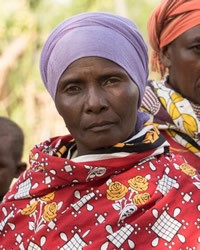Mijikenda, Digo in Kenya

Photo Source:
Erik Laursen, New Covenant Missions
|
Send Joshua Project a map of this people group.
|
| People Name: | Mijikenda, Digo |
| Country: | Kenya |
| 10/40 Window: | No |
| Population: | 435,000 |
| World Population: | 724,000 |
| Primary Language: | Chidigo |
| Primary Religion: | Islam |
| Christian Adherents: | 0.10 % |
| Evangelicals: | 0.05 % |
| Scripture: | Complete Bible |
| Ministry Resources: | Yes |
| Jesus Film: | Yes |
| Audio Recordings: | Yes |
| People Cluster: | Bantu, East-Coastal |
| Affinity Bloc: | Sub-Saharan Peoples |
| Progress Level: |
|
Introduction / History
The Digo are concentrated on the southern coastal strip of Kenya between Mombasa and the border of Tanzania. They are grouped with eight other tribes. Together these tribes make up the Mijikenda, or "nine towns." Tradition tells us that the nine Mijikenda tribes originated farther north but were driven south as a result of war.
During the nineteenth and early twentieth centuries, the Digo experienced a time of great famine. It became a common practice for them to give either themselves or their children as kore, or "blood money," to serve as temporary collateral for a loan of food. Sadly, there were many times when the debt could not be redeemed, thus leaving them to live as slaves. Many of the Digo who were brought to Mombasa as slaves later obtained their freedom by converting to Islam.
What Are Their Lives Like?
For many years the Digo have been involved in trade with Muslim Arabs. As a result, they have enjoyed a higher standard of living than most of their neighboring tribes. In addition to trading, farming and fishing are two other sources of income for the Digo. Their principal crop is "manioc," a small shrub with thick roots that are eaten like potatoes. They also grow sesame, corn, rice and beans. "Palm wine" is a popular drink produced from the palm tree.
The Digo tribe formerly lived in large, fortified villages but today their villages only consist of about 40 huts each. The shape of each hut clearly indicates to the villagers who live inside. The huts of elders are round, while those of other people are rectangular.
When a young Digo man marries, he must pay the normal bride-price of four heads of cattle, two goats or sheep and palm wine. He is then incorporated into the bride's family. Eventually, as he demonstrates leadership qualities, he will be accepted into the body of tribal elders.
What Are Their Beliefs?
Islam is more widely accepted among the Digo than among any of the other Mijikenda tribes. Nevertheless, ties with traditional practices (such as animism and ancestor worship) still influence the Digo community more than Islam. (Animism is the belief that non-human objects have spirits. Ancestor worship is praying to deceased ancestors for help and guidance.) One example of spiritism is their use of blood sacrifices. Such sacrifices are very significant to the Digo, especially in the exorcism of evil spirits. They regularly consult witchdoctors.
Most of the Digo people over forty years of age have no real understanding of the Koran. Only a few have studied Islam in any depth, and most have only a superficial knowledge of its principles and doctrines. However, its presence among the Digo over the past eighty years has not gone unnoticed. Its existence has altered both religious and political structures. For example, the people have adopted new attire and diets from their Muslim Arab neighbors. Although they know no religious significance for wearing the black veil, Digo women wear it to show respect for their husbands. This nominal identification with the Muslim religion is referred to as "folk Islam."
What Are Their Needs?
Healthcare and Social Services: Many Mijikenda and Digo communities face health challenges due to limited access to modern medical facilities. Traditional beliefs still play a significant role, especially in maternal healthcare, where many prefer traditional healers over hospitals. There is a need to improve healthcare infrastructure and raise awareness.
Education and Employment Opportunities: Like many marginalized groups, the Digo and other Mijikenda communities need improved access to quality education and employment opportunities. Education is crucial to lifting people out of poverty, but limited resources and infrastructure in coastal regions hinder educational outcomes. Education levels have improved somewhat compared to 30 years ago, thanks to the expansion of government schools and programs to increase literacy rates. However, the region still lags behind the national average regarding educational attainment. Limited access to quality education and infrastructure in rural areas, especially for girls, remains a significant issue.
Even though the nation of Kenya is predominantly Christian, the Digo have never been successfully reached with the gospel. They have a complete Bible translation in Chidigo, their heart language, but they need literacy training.
Prayer Points
Pray that God will cause the Digo people to become dissatisfied with their traditional religions and Islam, resulting in a search for truth.
Pray that God will empower the Kenyan church with the ability and the strategy to reach the Digo tribe with the gospel.
Pray that Christian broadcasts will become widely available in their Chidigo language.
Pray for the Christians working near the Digo settlements. Ask God to give them open doors for ministry to the Digo tribe.